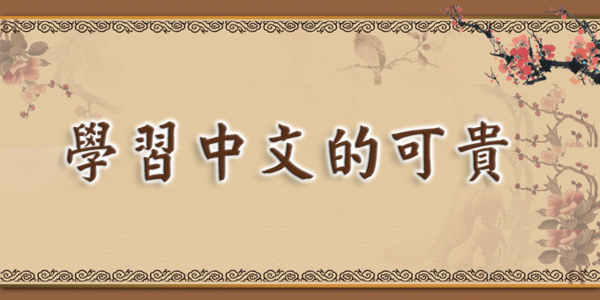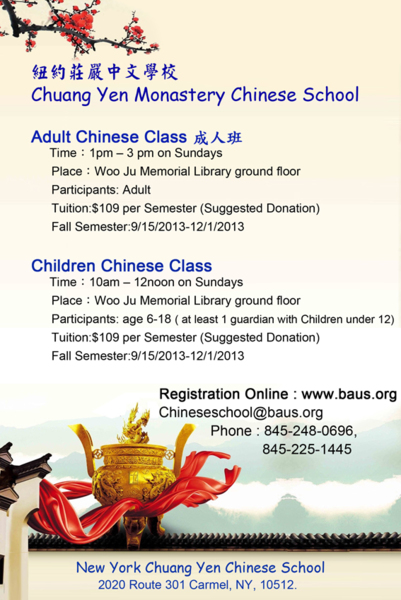

 字體:小 中 大
字體:小 中 大 |
|
|
|
| 2013/09/10 11:32:28瀏覽1219|回應4|推薦30 | |
這是2013年6月,美國佛教會會長-菩提比丘,在莊嚴中文學校春季班學期結束典禮上的講話,一位美籍的長老比丘,尚且鼓勵大家學習中文,身為華人的我們,在學習中華文化時,更應保護自己的文化(中譯在原講稿之後)。 I am delighted to be here today, and I extend my congratulations to Lucia Liu for introducing this program and to all the students who have completed the spring semester. I hope that you who have enrolled in this program won’t stop with an elementary knowledge of Chinese but will continue to study Chinese year after year until you can speak and read it fluently. Chuang Yen Monastery opened in the late 1980s.Its primary supporters through all these years have been Chinese people, yet this is the first time that the monastery has introduced a program in the Chinese language. This is due to the enthusiasm and commitment of Ms. Liu. She was not content simply to announce the class to the devotees of the monastery but she even went to the Putnam County School Board to make sure that students in schools throughout the area were informed that a Chinese class would be given at Chuang Yen Monastery. She knows that a knowledge of the Chinese language is not only for people of Chinese ancestry. For this reason we see here children of different racial and ethnic origins who have come to learn Chinese, and I was pleased to hear them speaking it so well. I hope that the Chinese language program here will become an ongoing project and that we will have more teachers, more students, and different levels of progress. It can become a center for disseminating a knowledge of Chinese throughout the greater Hudson Valley. It is very important for us to learn to speak and read other languages. The lack of emphasis on language study in the United States should be a reason for national shame. When I went to junior high school and high school, we all had to learn another language—at that time, mainly French or Spanish were taught—but I’ve heard that nowadays language study has fallen into neglect. This is a pity. We Americans think everyone should speak English, but this only encourages a narrow way of thinking. In Europe almost everyone can speak several languages. My friend, the Czech monk Ven. Thomas Dhammadipa, who teaches here from time to time, knows twelve languages, including Hebrew, Russian, Chinese, and Japanese. Another monk friend, Ven. Analayo, knows about eight languages. When I went to Germany, I found that, in addition to German, almost everyone knows at least English and French, and some can speak five or six languages. In today’s world, probably the most important language for everyone in America to learn is Chinese. China is now a major economic and political power, and I expect that in the future the relations between our two countries will grow ever closer. The Chinese cultural sphere extends still further, to Taiwan, Singapore, Malaysia, and elsewhere. Because every language is built upon a different way of thinking, when you learn a new language you learn to think in a different way. You expand the working of your mind. You learn to see the world in a different way, through another pair of eyes. And this enables you to relate to people from different cultural backgrounds. Chinese is especially important not only because contact with China will serve our business and economic interests, not only because it will be helpful for diplomacy and international relations, but because the Chinese language reflects the great spiritual traditions that have shaped the cultural heritage of China. This is why we are promoting Chinese language at our monastery. As you may know, Chinese culture has been formed by three great spiritual traditions: Confucianism, Taoism, and Buddhism. The former two are indigenous to China. Buddhism arose in India in the 5th century BC and came to China beginning in the 2nd century of the Common Era, but it was assimilated to the Chinese mind and assimilated into the stream of Chinese culture. Just as Buddhism took on a Chinese face, so Confucianism and Taoism were transformed by contact with Buddhism. By studying the Chinese language, we can absorb the values promoted by these three spiritual traditions. These values are extremely necessary in today’s world. You need not adopt any of these religions to appreciate their values, which are universal and relevant to us all. Taoism emphasizes humility and awe for the wonder and mystery of nature. Such wonder is so necessary if we are to preserve the natural world, and not destroy it for the sake of material good and profit. The vast mountains, the great rivers, the forests, the earth and the depths of space, all breathe with a spiritual force, and Taoism teaches us to revere and trust in the goodness of that force. When we leave the commotion of the cities, and enjoy a hike or picnic in the quietude of the countryside, admiring the splendor of woods and streams, the vast diversity of life forms, we are partaking of the mental orientation of Taoism. Confucians extol a virtue called仁 (rén). The character 仁consists of the radical 人 (rén) meaning a person, combined with the character 二 (èr) meaning two. Thus 仁is the ideal way for two human beings to relate to one another, in other words, it means humaneness, kindness, good will, or benevolence. The Confucians also teach the importance of respect: respect of children for their parents and of youngsters for their elders, and loyalty between siblings and friends. These virtues tell us that we must subdue our egos and behave in ways that show reverence and concern for others. Buddhism advocates the great values of loving-kindness and compassion, which we call慈悲 (cí-bēi), two characters that are built on the radical心 (xīn), which means heart. According to Buddhism, love and compassion must be accompanied by wisdom ( 智慧, zhì hùi), so that we base our concern for others on correct insight into the nature of reality. Thus if we are to become good human beings, we have to nurture a mind of wisdom and a heart of loving-kindness and compassion. These are the marks of a bodhisattva, one evolving toward the spiritual perfection of buddhahood. From this, we can see that to learn Chinese is to learn more than how to speak another language. It is to learn to trust in the goodness of nature. It is to learn how to be humble and sincere. It is to learn to act with good will and humanity in our relations with other people. And it is to make wisdom the ideal quality of the mind and loving-kindness and compassion the ideal qualities of the heart. May you all continue in your study of Chinese. May you become fluent speakers of this wonderful language and may you also be shaped by the great values taught by Chinese culture! Thank you. 今天同學們順利的完成了本學期的學業。在這個充滿喜悅的日子,我向你們表示最熱烈的祝賀,希望你們一直堅持下去,直到能夠講出一口漂亮的中文。我也向培育你們的老師劉璐致以衷心的感謝。 莊嚴寺是在八十年代由華裔建立的,中文課在這裡還是首創。授課老師不僅在寺院裡宣布這項活動,還到本地的學區進行大量的宣傳工作,因為中文這個凝聚中國五千年智慧和文化的文字符號,不僅是華裔的財產,也是全世界人民的財產,就像中國的四大發明一樣。今天,我們欣喜地看到不同種族和民族的學生們在這裡學習,而且我很高興聽到你們把中文講得這麼好。我希望我們紐約莊嚴中文學校,會有更多的老師、更多的學生,和多種程度的班級,我也希望它能夠成為整個哈德遜山谷傳播知識的中心。 學習外國語言是非常重要的。我們這個國家對學習外語不夠重視,就這一點而言,我們應該感到羞澀,同時這也是一種遺憾。我在上初中和高中的時候,外語是必修課,那時以法語和西班牙語為主。我們美國人認為每個人都應該講英文,其實這是一種狹隘的思維方式。在歐洲,除了德國人,幾乎每個人都知道英文和法文,有的甚至可以講五、六種語言。我的捷克朋友性空法師,他常在這裡指導禪修,他會講十二種語言,包括希伯來文、俄文、中文和日文;另外一個朋友阿難拉尤(音譯)他也會講八種語言。 在當今社會,中文對美國人來說,可能是最重要的一種語言。中國現在有著強大的經濟和政治實力,我希望在未來,我們兩國的關係將變得日益親密。中國文化對亞洲其他一些地區和國家的文化,有著深遠的影響,譬如新加坡、馬來西亞等。每一種語言都建立在不同的思維方式上,當你學習一門新的語言,你會以不同的方式去思維,這樣使你的頭腦更靈活,你會以不同的方式,通過另一雙眼睛去看世界,這使你容易了解不同文化背景的人。 中文的重要性不僅有利於我們從事商務、經濟及外交活動,中文同時反映了偉大的傳統精神,塑造了中國的文化遺產。這就是為什麼我們莊嚴寺,向當地居民提供學習中文的場所和機會。 正如你可能知道的,中國文化主要由三部分組成:儒家、道教和佛教。前兩者是在中國的本土所生,在公元前五世紀,佛教在印度產生,大約在公元前二世紀的時候傳到中國,它被同化到中國人的頭腦中,並融入中國文化的主流。正像許多佛教徒都是中國人,儒家和道教也潛移默化的受到佛教的影響。 通過學習中文,我們可以吸收這三個傳統的精神精髓。在今天的世界,這些是十分必要的,你不需要採取任何宗教觀去欣賞他們的價值觀,因為這是社會的普遍現象,這些和我們息息相關。道教強調大自然的神奇和神秘的謙卑與敬畏,這樣的奇蹟是必要的,我們要保護這個自然世界,並不是為了利潤而去摧毀它;鬱鬱森森的山巒、大江大河和森林,地球和空間的深處,所有的呼吸,都是一種精神力量的存在。道教教導我們敬仰和信任善良的力量,當我們離開喧囂的城市,在寧靜的鄉下享受野餐時,我們會欣賞繁茂的樹林和溪流,廣袤的生命形式的多樣性,這時我們是在體會道教的精神。 儒家讚美的一種美德叫仁(仁)。這個「仁」字,是由左邊的「人」和右邊的「二」組成的,這意味著一個人,結合二的含義。因此,仁是理想的方式,兩個人彼此之間的關係及推廣到人與人的關係,換句話說,這意味著人道、善良、良好的意願就是「仁」。儒家崇仁義禮智信,講尊重:孩子對父母和長輩的尊重,青少年和兄弟姐妹和朋友之間的忠誠度。這些優點告訴我們,「存天理,滅人欲」,克服己欲並積極主動地為他人著想。 佛教崇尚慈愛和憐憫的重要價值,我們稱之為慈悲,「慈悲」兩個文字建立在根本的心上,這意味著心。佛教講的愛和同情心,必須伴隨著智慧,使我們能夠以正確的洞察實相來關心他人。因此,如果我們要成為好的人類,我們就要培育有智慧的頭腦,和慈愛與憐憫的心。這些是做一個菩薩所表現出來的,最終能夠達到圓滿的佛境。 由此,我們可以看到,要了解中國是為了學習更多。而不只是學習如何講另外一種語言。而是學會信任和性善,它是學習如何謙虛誠懇,這有助於提高人際交往的效能,提升人際關係的融洽,對構建一個和樂的社會,有著積極的促進作用。 願我們的頭腦充滿智慧,願我們的心充滿慈悲,願你繼續學習中文,願你把這個奇妙的語言說得更流利,願你在中國文化的薰陶下使你的人格更加得到提升。謝謝。
|
|
| ( 知識學習|隨堂筆記 ) |











